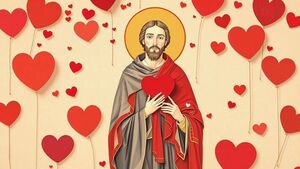Fr Paddy Byrne: The true meaning of St Valentine’s Day

St Valentines Day provides us with an opportunity to take stock of our relationships
THIS WEEK we celebrate St Valentine’s Day.
Traditionally, this day is associated with romance and love. Historically, it is interesting to trace its evolvement. There were probably at least three men known as Valentine, who were all executed by Roman emperors in the 3rd century. Their identities became conflated over the years to give us a composite of a singular St Valentine. And then, to further complicate things, 14 February was muddled up with a pagan festival called Lupercalia by Pope Gelasius in the 5th century. By the time Shakespeare was writing about Valentine’s Day, it had become something for romantics to celebrate and was quite different from its roots that involved running naked through the streets of ancient Rome flogging one another with dead goat carcasses.
But today it has become a commercialised cash cow that brings with it a load of expectations. Whether it’s roses, cards or chocolate, we have expectations around this holiday. And these expectations can often be difficult to manage. There are many of us who don’t have partners to share this day with. What does Valentine’s Day mean then?
Perhaps St Valentine’s Day becomes an opportunity to look at how there is a very real presence of love in our lives regardless of our romantic status – a different kind of love. Valentine’s Day provides us with an opportunity to take stock of our relationships with our families, our children and grandchildren, our neighbours, our friends, our communities. It provides an opportunity to assess our primary relationships and investigate how resilient we can be. It gives us an opportunity to re-evaluate and reaffirm our expectations.
A relic usually consists of the physical remains of a saint or the personal effects of that saint. They offer us a tangible memorial, something we can cling onto, something we can hold, venerate or be blessed with. The devotion to St Valentine in Whitefriar Street, Dublin goes back 189 years to the time when Carmelite priest Fr John Francis Spratt brought the sacred relics of St Valentine. It is thought that the relic of St Valentine is his heart.
Further details of Valentine suggest he was a Roman martyr, a third century priest, who ministered to Christians who were forbidden to marry or practice their faith, under the tyrannical rule of Emperor Claudius II. With Valentine, I feel that a serious piece of work still needs to be carried out, deciphering the truth from legend in a saint that goes back so many centuries.
There is talk of arranging secret marriages, falling in love with his jailor’s daughter, restoring her power of sight, cutting out the symbol of the heart in parchment to teach persecuted Christians that God loved them.
One of the great secular affirmations regarding love is that essentially, love is love. In the Gospels, Jesus personifies love. When his followers asked who is God? Jesus replied: “God is love”. When we love, we grow and become better and brighter within ourselves. Love nourishes hope, always includes and never fails to surprise.
St Paul reminds us: ‘Love is patient, love is kind. It does not envy, it does not boast, it is not proud. It is not rude, it is not self-seeking, it is not easily angered, it keeps no record of wrongs. Love does not delight in evil, but rejoices with the truth. It always protects, always trusts, always hopes, always perseveres.’ An ancient story tells of an island where all the feelings lived: happiness, sadness and all of the others, including Love. One day, it was announced to the feelings that the island would sink, so all repaired their boats and left. Love was the only one who stayed. Love wanted to persevere until the last possible moment. When the island was almost sinking, Love decided to ask for help. Richness was passing by Love in a grand boat. Love said: "Richness, can you take me with you?" Richness answered: "No I can't. There is a lot of gold and silver in my boat. There is no place for you here." Love decided to ask Vanity, who was also passing by in a beautiful vessel, "Vanity, please help me!" "I can't help you, Love. You are all wet and might damage my boat," said Vanity. Sadness was close by, so Love asked for help. "Sadness, let me go with you."
"Oh ... Love, I am so sad that I need to be by myself!"
Happiness passed by Love, too, but she was so happy that she did not even hear when Love called her! Suddenly, there was a voice: "Come, Love, I will take you." It was an elder. Love felt so blessed and overjoyed that he even forgot to ask the elder her name. When they arrived at dry land, the elder went her own way. Love, realising how much he owed the elder, asked Knowledge, another elder, "who helped me?"
"It was Time," Knowledge answered. "Time?" asked Love. "But why did Time help me?
Knowledge smiled with deep wisdom and answered: "Because only Time is capable of understanding how great Love is.” Love has that great gift to reach out beyond the limits of conditions and boundaries. Love is the door that remains open, the hand of friendship that always reassures and is best communicated in action, not just word.
A teacher once invited her students to “become possibilitarians. No matter how dark things seem to be or actually are, raise your sights and see the possibilities. Always see them, for they're always there”.
These times are certainly very challenging. However, when we reflect on the fundamentals of our lives, no matter what, we have much to be grateful for. Life is our greatest teacher, perhaps our most valuable lesson – the more we love, the greater we live.
Happy Valentines!




